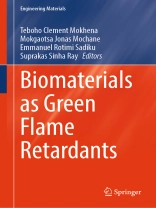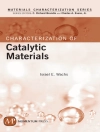This book highlights the utilization of biomaterials as emerging suitable and effective flame retardants (FRs) to replace most of the conventional FRs (e.g., halogenated FRs). Biomaterials are considered to be sustainable, biodegradable, and renewable resources. They are abundantly available, which makes them affordable. Information and findings on the characteristics of biomaterials and their use as FRs have been explored. Herein, the tremendous scientific progress made in using biomaterials as flame retardants for a wide range of products is elucidated. The major goal is to draw attention to the opportunities and challenges of switching to biomaterial-based FRs in place of conventional FRs in order to create a sustainable society.
قائمة المحتويات
Biomaterials as Green Flame Retardants.- Flame retardant properties of different polymers.- Alginate as flame retardant: synthesis, structure, properties, and applications.- Phytic acid: a novel phosphate bio-based flame retardant.- The preparation and characterization of tannic acid: a novel bio-based flame retardant.- Recent advances on the use of chitin and its derivatives as flame retardants for different polymeric materials.- Recent Developments on Flame Retardant Fibre-Reinforced Composite Materials.- Wood flour and other fiber composites: Properties and flame retardancy.- Fabrication and characterization of flame retardant nanocellulose-based materials.- Eco-friendly lignin-based flame retardant from different polymeric materials.- Preparation and characterization of nanomaterials from biomaterials for flame retardancy.- Recent Advances in Protein-Based Flame-Retardant Materials.- DNA: future bio-macromolecule flame retardant.- Recent developments on the use of eco-friendlier phosphazenes as flame-retardants for different polymeric materials.- Future trends for bio-based flame-retardant materials.
عن المؤلف
Dr. Teboho Clement Mokhena obtained his Ph.D. in Polymer Science from the University of the Free State, South Africa. He is presently employed for MINTEK Advanced Materials Division as a principal research scientist. His work focuses on using waste products to create valuable nanostructured materials for cutting-edge applications. His areas of expertise include the synthesis of flame-resistant materials, energy storage, polymer (nano) composites, nanostructured materials, and wastewater remediation.
Prof. Mokgaotsa Jonas Mochane obtained his Ph.D. in Polymer Science from the University of Free State. Currently, he is a professor in the Department of Chemistry, College of Science, Engineering and Technology, Florida Science Campus, University of South Africa. His research interests include natural fiber-reinforced composites, polymer-reinforced nanoparticles for advanced applications and natural fiber hybrid polymer composites and flame retardancy of polymers.
Prof. Emmanuel Rotimi Sadiku obtained his Ph.D. from the University of Strathclyde, Glasgow, Scotland, UK, where he specialized in polymer physics (polymer processing and X-ray diffraction, thermal characteristics, rheology and microscopy of polymers). He recently retired as a research professor at the Tshwane University of Technology (TUT), Pretoria, RSA. This follows his several years of research exposures in different countries, following graduation: Italy (1½ years), Sweden (1 year), Germany (3 months), University of Stellenbosch, RSA (2 years), and Sasol Pty., a South African Chemical Company, RSA (1½ years).
Prof. Suprakas Sinha Ray is a chief researcher at the Council for Scientific and Industrial Research with a Ph.D. in Physical Chemistry from the University of Calcutta in 2001, manager of the Centre for Nanostructures and Advanced Materials, and director of the DSI-CSIR Nanotechnology Innovation Centre. He is also associated with the University of Johannesburg as a distinguished visiting professor of Chemical Sciences. His current research focuses on polymer-based advanced nanostructured materials and their applications.












